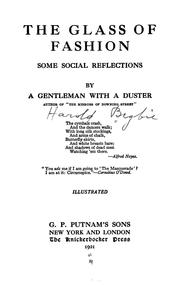
Provoked by a mention of a pseudonymous author, the Gentleman with a Duster, in the creationist Arthur I. Brown’s Evolution and the Bible (1922), quoted at length as complaining about the moral effects and scientific groundlessness of “Darwinism” in his The Glass of Fashion (1921), I decided to investigate. In part 1, I reported that the Gentleman with a Duster (used to clean the mirrors in the halls of power, as it happens) was the journalist Edward Harold Begbie (1871–1929). Since Begbie’s authorship of The Glass of Fashion was not revealed until after his death, Brown could, I suggested, be excused for not recognizing that the author lacked the scientific training to offer a really informed opinion about scientific grounds of Darwinism and for not realizing that he was already on record as accepting evolution, as in The Proof of God (1914), published under Begbie’s own name. I’ll add now that the author’s skeptical attitude toward the scientific bona fides of natural selection is also understandable.
For Begbie to hold in 1914 that natural selection was unimportant in evolution and in 1921 that Darwinism, sensu the primacy of natural selection in evolution, can be rejected “on scientific grounds” is, in fact, fairly unobjectionable. After all, he was writing at a time that Julian Huxley, in Evolution: The Modern Synthesis (1942), dubbed the eclipse of Darwinism: when, as Huxley writes, “Zoologists who clung to Darwinian views were looked down on by the devotees of the newer disciplines, whether cytology or genetics, Entwicklungsmechanik or comparative physiology, as old-fashioned theorizers; and the theological philosophical antipathy to Darwin’s great mechanistic generalization could once more raise its head without fearing too violent a knock.” (Huxley, it will be remembered, was the grandson of Darwin’s bulldog Thomas Henry Huxley.) And it is hardly unreasonable for a journalist such as Begbie, not trained in biology, to take his lead on a controversy about the causes of evolution from a scientific majority of his day.
Yet that’s no explanation for the hostility to “the dark and disfiguring shadow of Darwinism” seen in the American introduction to The Glass of Fashion. By 1921, Begbie was apparently conflating atheism as supposedly inspired by Darwin with Darwinism sensu the primacy of natural selection in evolution. Without knowing more about Begbie’s intellectual development—there is apparently no biography of him, and precious little about him in the standard biographical sources—it’s impossible to ascertain what might have been responsible for that shift. But it’s a common enough conflation for the time, and Begbie—a broad church Anglican involved with the Oxford Movement (later Moral Re-Armament) and the Salvation Army (of whose founder William Booth he wrote a biography)—was certainly moving in circles in which opposition to atheism was important. (He even wrote a book affirming the reality of the angels of Mons, who supposedly defended a contingent of British troops during the First World War.)
Again, since there’s no reason that Brown should have realized that the Gentleman with a Duster whom he so avidly quoted toward the end of Evolution and the Bible was the same as Begbie, who was perfectly happy in affirming evolution in his The Proof of God (1914), there’s no reason to complain that his quotation of the Gentleman’s views on “Darwinism” distorts Begbie’s public views on evolution. But it distorted the Gentleman with a Duster’s views! For The Glass of Fashion, while not particularly concerned to discuss evolution as such, is conspicuously not hostile to it. Toward the end of the book, for example, there appears the following:
To one who could convince humanity of its context, could reveal to it the universe as a book from which the page of earth cannot be torn, one who could make it perceive that evolution is at work now in the spirit of man, just as it was at work millions of years ago on the separate elements of protoplasm, to such a one I believe the human race would listen, at first with incredulity, but afterwards with relief and gladness. (emphasis in original)
The point here is about spiritual development, of course, but the fact that the Gentleman with a Duster casually and without apparent reservation offers such a comparison strongly suggests that he accepts biological evolution. Brown’s failure to acknowledge that the book whose introduction he so gleefully cited for its opposition to “Darwinism” also contained such passages suggests that he failed to read the whole book or that in his glee he failed to distinguish between evolution—which was, then as now, accepted by the scientific community on its merits—and Darwinism (as well as between atheism as supposedly inspired by Darwin and the primacy of natural selection in evolution).
Since quotations take on a life on their own in the antievolution literature, I wasn’t surprised to find the introduction from The Glass of Fashion quoted by William Jennings Bryan in the chapter of In His Image (1922) on “The Origin of Man,” although since the book was based on Bryan’s James Sprunt Lectures delivered in 1921, he probably didn’t rely on Brown’s Evolution and the Bible, since it, too, was published in 1922. I was amused, however, to find that the Gentleman with a Duster referred to Bryan in a book that he also published in 1922. In Painted Windows, the author says that “the right understanding of life … cannot be given by any theory of the universe, which, like the biblical one, is in glaring contradiction to the facts of modern science.” Perched at the end of the sentence is a superscripted numeral leading to a footnote: “Mr. Bryan is right in maintaining that evolution and the whole scientific concept of life is unbiblical, though wrong in thinking that that settles the question.” Ouch.

